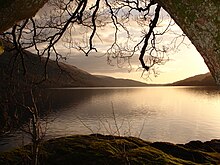Ecosystem
community of living organisms together with the nonliving components of their environment, interacting as a system
An ecosystem is a community of living organisms (plants, animals and microbes) in conjunction with the nonliving components of their environment (things like air, water and mineral soil), interacting as a system.

| This biology article is a stub. You can help out with Wikiquote by expanding it! |
Quotes
edit- If we recognise that every ecosystem can also be viewed as a food web, we can think of it as a circular, interlacing nexus of plant animal relationships (rather than a stratified pyramid with man at the apex)... Each species, be it a form of bacteria or deer, is knitted together in a network of interdependence, however indirect the links may be.
- Murray Bookchin, The Ecology of Freedom (1982).
- I dare you to stand in a redwood grove and not be humbled, or to dive on a coral reef and see even just the glimmer of its former magnificence and have some respect for these ecosystems and the fact that we are sharing this planet.
- Ayana Elizabeth Johnson Interview with On Being (2022)
- The organization of life extends beyond the individual organism to the biosphere, the zone of air, land, and water at the surface of the Earth where organisms exist. Individual organisms belong to a population, which is all the members of a species within a particular area. The populations of a community interact among themselves and with the physical environment (e.g., soil, atmosphere, and chemicals), thereby forming an ecosystem.
- Sylvia S. Mader, Biology (10th ed., 2010), Ch. 1. A View of Life.
- Ecosystems are characterized by chemical cycling and energy flow, both of which begin when photosynthetic plants, aquatic algae, and some bacteria take in solar energy and inorganic nutrients to produce food in the form of organic nutrients.
- Sylvia S. Mader, Biology (10th ed., 2010), Ch. 1. A View of Life.